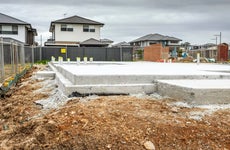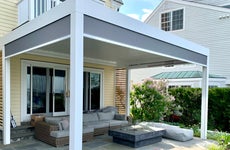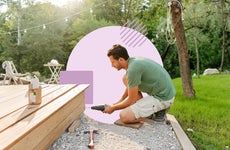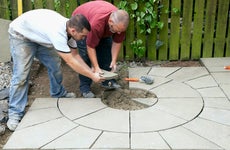What does it cost to build a tennis court?
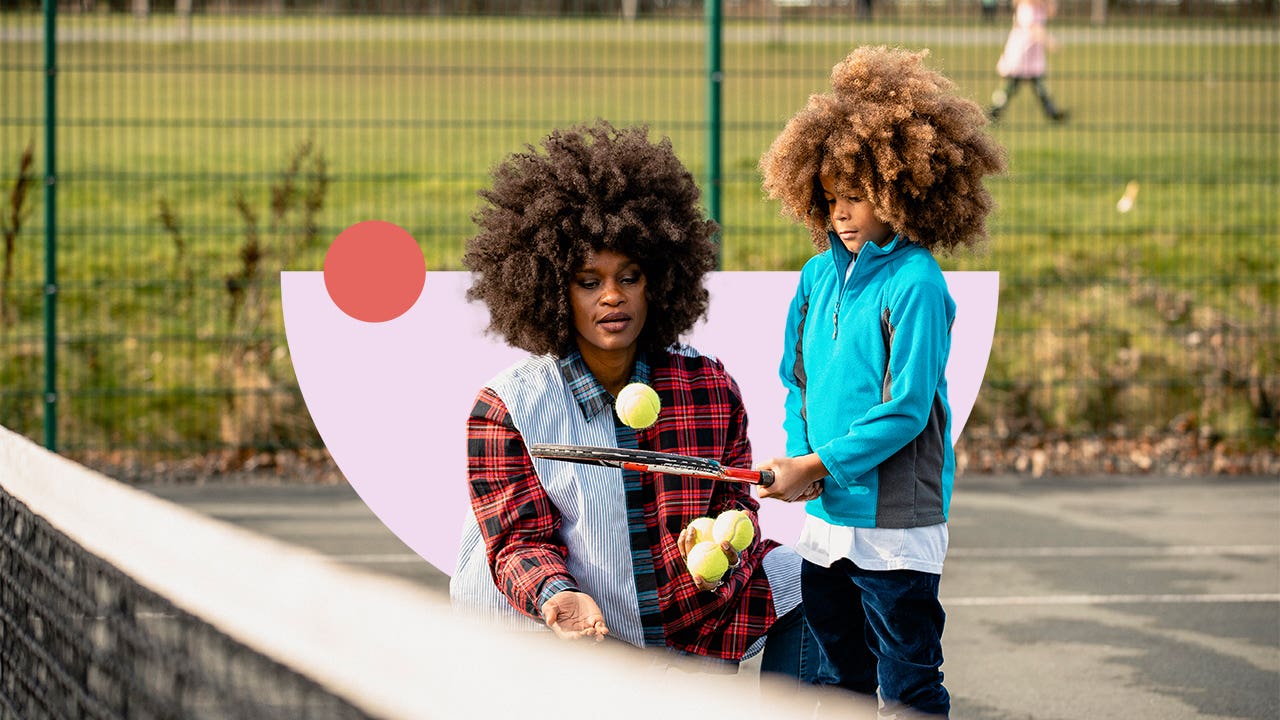
The Bankrate promise
At Bankrate we strive to help you make smarter financial decisions. While we adhere to strict , this post may contain references to products from our partners. Here's an explanation for .
If you play the time-honored game of tennis, you might want to invest in a court of your own. The advantages are many: no need to reserve ahead of time, no club fees to pay, and no tedious travel to and fro. All you need to build a tennis court is a lot of space and a lot of money.
How much money? According to HomeGuide, the average cost to construct a tennis court (regulation doubles size) runs around $65,000; costing around $5 to $14 per square foot, some can be as low as $25,000, and others come in around $115,000. The price depends on the type of surface, the labor required and the sort of extras you want.
Ready to play ball? Read on.
Key Takeaways
- You can expect to pay between $25,000 and $115,000 to build a tennis court at your home, with the average cost running around $65,000.
- The court surface plays a large part in the price: Clay and turf courts tend to be cheaper to install, while asphalt and concrete ones are pricier.
- You’ll also need to account for maintenance (another $1,800 per year) : Generally, the softer the court surface, the more time-consuming it is to maintain.
What are the types of tennis courts?
A traditional regulation-size tennis court that’s equipped for doubles play measures 78 feet long by 36 feet wide. Most courts also include space behind the baseline — the runback — and at the sides. Overall, you’d usually need 130 feet by 70 feet for the full court. Smaller options include half-courts (good for practice) and singles courts (which lack the doubles alley and are only 27 feet wide), but these aren’t really practical for most homeowners.
Unlike golf courses, tennis courts don’t vary in design. But they do vary in surface. “Tennis courts can be made from a variety of materials, including concrete or asphalt, clay, or grass,” says Mario Musa Mario, a professional tennis player in New York and founder of advice site TennisRacketBall.com. “Clay courts are the easiest outdoor courts to build, but if you live in a rainy location, that would be a problem, and you must go for asphalt or concrete courts, which are the most expensive.”
Within the three basic categories of grass, clay and hard courts, these are some of the popular materials available for your tennis court.
- Grass: The original tennis surface, and what they play on at Wimbledon. Providing a fast game, a grass court requires regular maintenance and, while starting at $45,000, can also run into the six figures to install.
- Clay/Har-Tru: The second-oldest surface. Easy on the knees and providing a slower game, a clay tennis court is the most affordable type of tennis court — can be as low as $25,000. But it requires constant maintenance — regularly raking the powder sprinkled on its top, which pools during play.
- Asphalt: The original “hard” surface. Low-maintenance asphalt tennis courts provide fast play, and are largely affordable compared to other types of hard ennis courts, averaging about $70,000.
- Post-tensioned concrete: Another hard surface, constructed to prevent cracking. A concrete court can cost up to $115,000, costing almost as much as grass but with hardly any of the maintenance; it’s more durable than asphalt, too.
- Turf/Astro-Turf: A synthetic with a grassy feel, turf can get as pricey as the real thing, but lacks the upkeep hassles.
Tennis Court Costs and Upkeep
| Type of material | Average Overall Cost | Maintenance Level |
|---|---|---|
| Source: HomeGuide | ||
| Clay/Har-Tru | $25,000-$90,000 | Extremely high |
| Asphalt | $40,000-$100,000 | Moderately low |
| Grass | $45,000-$110,000 | Near daily |
| Concrete | $60,000-$115,000 | Low |
| Turf | $35,000-$95,000 | Very low |
What influences the costs of tennis courts?
The type of surface is the single biggest factor impacting your tennis court’s costs: “Hard court surfaces tend to cost less than soft courts,” says Ally Mashaura, editor-in-chief at Adventure Pursuit. But there are other factors to consider beyond just the choice of material, which can boost the price tag.
The final cost of constructing a tennis court takes into account the entire installation process, including preparing the ground and adding a base before laying down the actual surface, whether it is clay, grass, or concrete. So “the natural state of the terrain where the court is being constructed will influence costs, as steeper grounds will require cutting and filling for easier maintenance,” Mashaura says. Tree stumps or rocks can make it difficult to dig and shape your site as well.
Other factors that can influence tennis court costs
Fencing
Most court installers recommend including a high-quality fence around the court, unless you like chasing after and looking for lost balls. Fences can run an additional $4,300 to $10,800.
Lighting
If you plan to play at night, lightingg is a necessity. Illumination usually costs $1,500 to $6,000.
Bubbles
If you don’t live in a warm climate, a tennis bubble can be a convenient addition: Not only does it provide invaluable protection for your court, but it also allows year-round play. Tennis bubbles aren’t cheap, however, costing anywhere from $45,000 to $100,000.
Permits
You might also have to get a permit to build a tennis court at your home. Depending on where you live and how much work you’re doing, you can expect to pay between $100 and $750 for these permits.
Extras
Need a place to store your rackets, balls, cleaning gear and other equipment? That will add another $300 to $2,500 to your bill, depending on how elaborate in storage you want to go. Don’t forget benches, tables or chairs ($200-500 apiece).
What does it cost to maintain a tennis court?
Maintenance is critical for any tennis court, but exactly how and when depends on the type of court you decide to install.
For instance, a grass court will need to be mowed, trimmed, and watered — often several times a week.
Though a clay court can handle the dry air and humidity of America’s more arid regions, it has to be swept regularly — ideally, after each time you play — and the sand annually refreshed. Some aficionados install a sprinkler system to shower it daily or weekly. Treated properly, these types of courts can last indefinitely.
Hard courts don’t require daily maintenance, a key reason for their popularity. However, they can be prone to cracking (particularly asphalt), gouges and sinking. Holes and cracks should be repaired pronto. Count on resurfacing and repainting them entirely every five years, depending on climate and weather conditions, which can cost about $4,000 to $10,800, according to HomeGuide.
“Many of these tasks require professional services or equipment,” Mashaura says.
So, overall, how much does a tennis court cost to maintain? Fixr, the online home-improvement cost guide, places the average cost of tennis court maintenance at $1,800 a year.
Does a tennis court add value to your home?
A tennis court installation can add anywhere from $20,000 to $150,000 to your home’s value, according to HomeAdvisor. Of course, it’s a special-interest feature that won’t appeal to all. But it often can be a selling point, and if personal courts are standard in your community, not having one could be a detractor.
Next steps on building a tennis court
When you are ready to move forward, talk to a tennis court contractor: This is one project that is universally recommended for professionals, not DIY-ers, to do. Discuss the different types of surfaces, and be honest about how much upkeep you want to have (or avoid). When interviewing potential contractors, be sure to ask about the costs for maintaining your tennis court, as well as the time needed to complete the project and what warranties are included.
Given the five-figure — even six-figure — expense, this is the sort of project you might want to finance. Consider taking out a home equity loan or a home equity line of credit; the interest could be tax-deductible, since the court would be considered a substantial improvement to the property.
Additional reporting by Taylor Freitas
Related Articles
